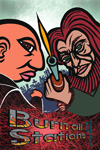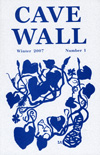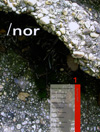Holy Cow! It’s 30 years old! “If you had to name the home of the oldest literary presses in Minnesota, you’d probably say the Twin Cities. But to be correct, you’d also have to mention Duluth. It’s home to Holy Cow! Press, which is celebrating its third decade.”
NewPages Blog
At the NewPages Blog readers and writers can catch up with their favorite literary and alternative magazines, independent and university presses, creative writing programs, and writing and literary events. Find new books, new issue announcements, contest winners, and so much more!
Publishing
Spread the word!
The Antioch Review – Winter 2007
Antioch Review celebrates its 65th year of publication with this fine issue’s eclectic collection of essays, fiction, poetry, book reviews, and et cetera, which includes Editor Robert S. Fogarty’s thoughtful editorial, “Nolan Miller (1907 – 2006),” on the last of the journal’s founding editors, and John Taylor’s “Poetry Today.” Thomas Washington’s “A Quarterly Reader (and Writer),” laments the absence of editorials in many quarterlies, as do I. If you enjoy sophisticated spy stories, you’ll love “Tunis and Time” by Peter LaSalle; Stephen Taylor’s “Bloomsbury Nights: Being, Food and Love” will bring you closer, perhaps (to a dictionary); “Odessa” by Rick DeMarinis will remind you of those among us who cannot sort things out. Continue reading “The Antioch Review – Winter 2007”
Spread the word!
Zahir – Spring 2007
When I was in college, the English majors and science majors just didn’t get along. Reading Zahir, I kept wondering what all that tension was about, since so many of this journal’s cross-disciplined writers are able to blend their interests in creative writing and science so well. My favorite piece in this issue is Jerry Underwood’s “Traveling Companion,” set in a world which is simply a very long train, constantly moving on a Track with no beginning or end in sight, inhabited by robots all named Bob (if male) or Bobbie (female). Continue reading “Zahir – Spring 2007”
Spread the word!
Million Poems Show NYC
“The next episode of The Million Poems Show is this Monday, March 26, at 6:30 p.m. at the Bowery Poetry Club (1st & Bowery, NYC). Buck Downs, author of Marijuana Soft Drink, Recreational Vehicle, and many other fundamentally unstoppably brilliant collections of poems, will be taking the stage. As will Nicole Renaud, the singer the New York Times describes as an “ethereal soprano,” and whom the New Yorker says “earns the overused descriptor ethereal.” Franklin Bruno sings the theme song, banters, collaborates, and if you’re good, he takes us out with a song. And as for me [Jordan Davis], I try to make it so you almost forget you’re at a poetry event. The Million Poems Show is free. What’s more, it coincides with happy hour — come by Monday, have a couple drinks. The words will do things you don’t see coming.”
Spread the word!
Comic Books
Two new offerings from Nick Threndyle, artist and poet out of Victoria, BC – Gringo and Burn All Stations. Sample pages can be viewed on his website. Not new to zines/graphic fiction, Threndyle’s work, Golden Eyes on the Ocean Floor had previously been reviewed in the NewPages Zine Rack.
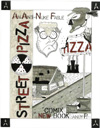
Also in the mail, Street Pizza #1 from Undercore Comix hand-drawn and inked by underground cartoonist Andy P., creator of Tromatic Tendencies: The Story of Lloyd Kaufman.
Spread the word!
Literary blog shop
Press Press Press “is a blog-shop for small poetry presses & journals. If you like small poetry presses & journals then you should stop in & see what’s new. Everything is new. All of the time.”
Spread the word!
Words
Why Sexist Language Matters, by Sherryl Kleinman, AlterNet. “Gendered words and phrases like ‘you guys’ may seem small compared to issues like violence against women, but changing our language is an easy way to begin overcoming gender inequality.”
Spread the word!
Literary magazine reviews
We’ve posted a new batch of lit mag reviews at NewPages.com. Reviews of Barrelhouse, Burnside Review, The Chattahoochee Review, Crazyhorse, Fairy Tale Review, Five Points, Georgia State University Review, Green Mountains Review, Hunger Mountain, The Literary Review, Natural Bridge, Pleiades, Prairie Schooner, The Sewanee Review, The Souther Review, and subTerrian. Some really good reading!
Spread the word!
Books :: LibriVox
LibriVox free audio books from LibrarianActivist.org: “LibriVox is a volunteer project with the goal of making pubilc domain works available as audio books. There’s a plethora of goodies here for bibliophiles. Not only is the available of classic works a beautiful thing, but access to audio books is a boon to those who benefit from having access to books through alternative mediums … coming to mind: people who self-identify as LD, ADHD, or visually impaired…”
Spread the word!
Books :: God Is Not Great by Christopher Hitchens
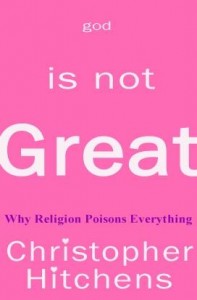 Congratulations, Christopher Hitchens! But Why Won’t You Bring The Funny? From the Huffington Post. “…his upcoming book, God Is Not Great: How Religion Poisons Everything (May 1, 2007), sounds like a laugh riot. Check out this sample line: ‘Monotheistic religion is a plagiarism of a plagiarism of a hearsay of a hearsay, of an illusion of an illusion, extending all the way back to a fabrication of a few nonevents.’ Try the veal! Remember to tip your waitress!
Congratulations, Christopher Hitchens! But Why Won’t You Bring The Funny? From the Huffington Post. “…his upcoming book, God Is Not Great: How Religion Poisons Everything (May 1, 2007), sounds like a laugh riot. Check out this sample line: ‘Monotheistic religion is a plagiarism of a plagiarism of a hearsay of a hearsay, of an illusion of an illusion, extending all the way back to a fabrication of a few nonevents.’ Try the veal! Remember to tip your waitress!
Spread the word!
Libraries
New Progressive Librarians Guild chapter at Graduate School of Library and Information Science, University of Illinois at Urbana-Champaign. “The purpose of PLG is to foster discussion and action related to librarianship and social responsibility. We believe that the vital role of the library in a democratic society requires a politically and socially engaged profession.” Includes links to other chapters.
Spread the word!
Book Review
Poets in full bloom. Leslie Adrienne Miller, Deborah Keenan and Diane Glancy — longtime Minnesota English professors — are at the height of their poetic powers in these three new collections. Reviews by Andrea Hoag, Minneapolis Star-Tribune.
Spread the word!
Scene New: Lit Mags
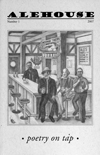 One of the benefits of attending AWP is getting to meet and discover “new” lit mags on the scene. As saddened as we so often are to hear of magazines folding under economic or other life constraints, it is at the same time with great joy that we see new mags crop up, with invigorated, often “youthful” labor, and somehow enough change in their pockets (or foraging skills) to get the publication started. Who knows where these fresh starts may end up; no doubt some of the long-standing lit mags have staff who remember their start-up days — before they went glossy, before they went 501c(3), before the .com, before finding a comfortable hold within academic walls, or perhaps after leaving academia behind… A smattering of new mags offering an infusion of hope include:
One of the benefits of attending AWP is getting to meet and discover “new” lit mags on the scene. As saddened as we so often are to hear of magazines folding under economic or other life constraints, it is at the same time with great joy that we see new mags crop up, with invigorated, often “youthful” labor, and somehow enough change in their pockets (or foraging skills) to get the publication started. Who knows where these fresh starts may end up; no doubt some of the long-standing lit mags have staff who remember their start-up days — before they went glossy, before they went 501c(3), before the .com, before finding a comfortable hold within academic walls, or perhaps after leaving academia behind… A smattering of new mags offering an infusion of hope include:
Alehouse, San Francisco, CA. Editor Jay Rubin, Contributing Editors Edward A. Dougherty, Kake Huck, and Gary Lessing.
Cannibal, Brooklyn, NY. Editors Matthew Henriksen (also of TYPO) and Katy Henriksen.
Cave Wall, Greensboro, NC. Editor Rhett Iseman.
New Ohio Review or /nor, Ohio University, Athens, OH. Managing Editor John Bullock.
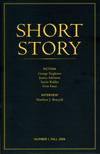 Short Story, Columbia, SC. Editor Caroline Lord.
Short Story, Columbia, SC. Editor Caroline Lord.
We wish these newbies the best in their endeavors, and hope to see them continue to grace our pages.
Spread the word!
Poetry
The Spring 2007 Book Sense Picks Poetry Top Ten. “The list features a notable selection, including titles from a former U.S. poet laureate, a Nobel Prize winner, a Yale Series of Younger Poets winner, and comprehensive collections of two contemporary masters. The Poetry Top Ten is the result of strong support from booksellers, reflecting a deep level of knowledge and commitment.”
Spread the word!
Bookstores :: Changing Hands PW’s Bookseller of the Year
Changing Hands Named PW’s Bookseller of the Year. Changing Hands Bookstore in Tempe, Arizona, has been named the recipient of the 15th annual Bookseller of the Year Award from Publishers Weekly. The bookstore, which celebrates its 33rd anniversary this year, is co-owned by Gayle Shanks, her husband, Bob Sommer, and Susie Brazil. PW reported that the store was nominated by Random House’s district sales manager, Ron Smith, who said, “The enthusiasm, energy and creativity of the people of Changing Hands Bookstore is what makes me look forward to each visit.”
Spread the word!
Online lit mag
Open Letters: A Monthly Arts & Literature Review debuts with “among other things, a sharp, critical work by John Cotter on the reviews of Martin Amis’s “House of Meetings”; an involved examination of the writing of young first-time novelists; and our headliner, an unsparing assessment of ALL 20th literature by Steve Donoghue.”
Spread the word!
Roger, roger!

Another lit mag face lift – er, name lift: roger, an art & literary magazine is the former Calliope (of Ampersand Press), still based out of Roger Williams University. While the current editorial staff remarks that “we will avail ourselves of the Internet with our Web site,” the site has yet to be “launched” (what’s there now isn’t much…). Still, the publication is “committed to hard copy,” so it would seem it’s just a matter of getting name, web space and print publication to fuse as one for this publication to become fluent in its efforts. For NewPages users, the sooner on the web presence, the better!
Spread the word!
Two Lines Journal Crosses the Line
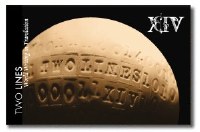
Two Lines: World Writing in Translation, part of the Center for the Art of Translation in San Francisco, CA, has published English translations of fiction and poetry from more than 50 languages for over a decade. Now, thanks to partnership with the University of Washington Press, this former journal has shed its ISSN to become a full-fledged ISBN’d book. “Better for distribution and sales,” says Promita Chatterji, Two Lines Marketing Administrator, and better as well as for the continued excessive content that burst the seams of the lit journal boundaries. (“Really, it’s a journal,” they would say, hefting it two-handed off the table at AWP to suspicious readers.) Our best to Two Lines on their new venture; we’ll miss them on the NewPages lit mag list.
Spread the word!
Coleman Barks at AWP
Hearing Coleman Barks read at AWP Atlanta was the absolute highlight for me. I’ve read much of his translation of Rumi and only knew that of him. I was equally awed by his reading his own poetry that night – his non-Rumi poems. Not only is his delivery enough to carry you from the physical realm into the poetic ethereal, but his down-homey nature in his reading was like being wrapped in a cozy blanket on a cold winter’s eve. While reading, he would interject chuckles, amused by the memory of the line or the event therein reflected, and would add commentary, such as “This really happened,” as he talked the crowd of hundreds through his lines as though to a single friend over coffee. A smattering of his poetry with RealAudio recordings can be found on Courtland Review’s website. Coleman will be busy traveling this year, celebrating the 800th birthday of Rumi; if you’re lucky enough, you might be able to catch up with him.
Spread the word!
Meena at AWP
Like most of those who attended AWP in Atlanta (Feb. 28 – Mar. 4), I’m still in hangover mode – and it has nothing (or at least little) to do with alcohol. My mind is still spinning with memories of meeting dozens of people, from teachers to publishers, students in MFA programs to published authors, and so many, many people who just wanted to stop by and say “Thanks” to NewPages for the work we do (likewise – I’m sure!). Yet, now sorting through my two boxes of lit mags to get listed, the first one I pulled out was one that most impressed me among new publications: Meena.
What makes the mag a standout is very concept of it: English/Egyptian works both in their original language and in translation (half the pub is English, the other half Arabic), with art throughout. From the pub site: “The word ‘meena’ means port, or port-of-entry, in Arabic, and that is exactly what we would like Meena to be: a port between our cities, our countries, our languages, our cultures. ‘We’ are a group of writers and artists based in the port cities of New Orleans and Alexandria but from all over the United States and Egypt (and beyond) who want to share our work with each other and with you.”
Given the global climate, this is a publication well worth checking out and including in course reading lists, library collections and just passing around the cafe.
Spread the word!
Online lit mags
Wheelhouse Magazine Online launches its debut issue, Vol. 1, with contributions from fiction writers Jim Ruland, Nahid Rachlin, Mimi Albert, Diane Lefer, Curtis Harnack, Lourdes Vasquez; poetry from Tung Hui Hu, Pat Falk, Natasha Saje, Marilyn Taylor, and Jared Carter; visual arts by Daniel Johnston, Tom Carey, and Marc Leuthold; essayists Steve Heller and Sheyene Foster Heller.
Spread the word!
Online lit mags
BENT PIN Quarterly, a new online journal is currently accepting poetry, essays, and flash fiction for its first issue, Spring 2007.
Spread the word!
Literary magazines
Connecticut Review, Georgetown Review, and Upstreet are new additions to our NewPages guide to literary magazines.
Spread the word!
Online lit mags
Clemson Poetry Review is a new online literary journal based at Clemson University in South Carolina that publishes undergraduate and graduate poetry exclusively twice a year, spring and fall.
Spread the word!
Contests
Check contests with March dealines in the NewPages.com Writing Contests page.
Spread the word!
Barrelhouse – Issue 3
If pop culture irritates and disgusts you, then this magazine is for you. If you’re a pop culture junkie and your admiration for Patrick Swayze and Mr. T is rivaled only by admiration for your father, then this magazine is for you. Equipped to satisfy the panoply of individual tastes, Barrelhouse brilliantly succeeds at “bridging the gap between serious art and pop culture.” With a wide range of fare – essays, interviews, poetry, fiction, art – Barrelhouse has it all. I mean, come on, who else is publishing poetry about Ed Asner? Exactly. Fiction in this issue is strong across the board, and to be fair, each piece deserves its own review. Melissa Yancey’s “Recommended if You Dig” is a perfect example of the Barrelhouse blend, where the young indie protagonist may finally have fallen in love but becomes obsessed with the fact that the woman he’s seeing does not share his love for Neutral Milk Hotel, and this seemingly irreconcilable difference threatens to be the deal-breaker. Another excellent piece is Wendy Wimmer’s “Billets Doux,” an art/fiction piece (Barrelhouse art director Kylos Brannon does a top-notch job laying this piece out) comprised of emails tapped on a Blackberry, offering verbal snapshots cumulating in a portrait of loneliness and desire. Continue reading “Barrelhouse – Issue 3”
Spread the word!
Poetry
Poetry & Commitment by Adrienne Rich. Poets Against the War newsletter. “I’m both a poet and one of the ‘everybodies’ of my country. I live with manipulated fear, ignorance, cultural confusion and social antagonism huddling together on the faultline of an empire. I hope never to idealise poetry – it has suffered enough from that. Poetry is not a healing lotion, an emotional massage, a kind of linguistic aromatherapy. Neither is it a blueprint, nor an instruction manual, nor a billboard. There is no universal Poetry, anyway, only poetries and poetics, and the streaming, intertwining histories to which they belong.”
Spread the word!
Interview with Margarita Donnelly
We are just serious readers in my family, and I grew up imbued with the love of literature. I am also a feminist and a humanist and believe in equality. So discovering and publishing new and emerging women writers and giving voice to those who haven’t had the chance fits. None of us who does CALYX does it for any other reason than our commitment to women and our love of literature and art. We certainly don’t do it for financial gain.
Spread the word!
Literary Magazines
New literary magazine reviews posted at NewPages.com
Reviews of Apostrophe, Callaloo, Cimarron Review, Driftwood, Ecotone, Gulf Coast, Heliotrope, Literary Imagination, Make, Poetry Kanto, The Saint Ann’s Review, The Saranac Review, Swivel, and TriQuarterly.
Spread the word!
The American Scholar – Winter 2007
The American Scholar celebrated 75 years with the publication of its winter issue. To mark this outstanding achievement, Robert Wilson, the journal’s editor of two years, asked two contributing editors to read every issue from the past 75 years (300 in all) and comment on the journey. The results are fascinating—both in terms of the writers who have written in The Scholar (e.g. John Updike, Oliver Sacks, Barbara Tuchman, Rita Dove, and Hannah Arendt), and in terms of how the journal’s contents trace larger social, political, and ideological movements. Wilson writes in his editor’s note that he noticed how “arguments became more specific, more rooted in particular cases or in personal experiences, more dependent on narrative” Continue reading “The American Scholar – Winter 2007”
Spread the word!
Apostrophe – 2006
Entering its tenth year of publication, this journal of the University of South Carolina at Beaufort offers readers fiction, creative non-fiction, and poetry by established and emerging writers. Kathleen Rooney’s essay “Coy Mistress,” about her work as an artist’s and photographer’s nude model appealed to me, perhaps all the more so because I read it while sitting clothed in a paper gown on a physician’s examination table, and over the years, I’ve wondered how a person guards her/his composure while under such close scrutiny. Rebecca McLanachan’s essay, “Interstellar,” delves into the relationship between two sisters. Artfully structured around the recurrent image of double stars, it movingly portrays their changing relationship over time. In the short story “Uncle Will,” Ron Cooper convincingly depicts an irascible older man and his clever solution to the perennial problem of transportation. Poems by some two dozen authors take up half of the journal. They include works by Nelson James Dunford, Michael Johnson, Sharon Doyle, David Lunde, and Jane Sanderson. Standouts are Michael Bassett’s “Aphorisms of One Who Calls Himself Legion Because He is Many”: “The wounds we cannot live / without define us the way the night / sky outlines the stars.” Similarly, in her prose poem (or flash memoir) “Detour,” Sanderson powerfully depicts the feelings a person experiences upon visiting a once concentration camp, now memorial. Frederick Zydek’s “Dreams That Get It Right,” part of a collection-in-progress about dreams, also prompted me to think, with these lines: Continue reading “Apostrophe – 2006”
Spread the word!
Black Warrior Review – Fall/Winter 2006
Stylish and quirky, BWR continually reimagines what it means to be a university-affiliated journal. Amid the chapbook and gorgeous art portfolio, Steve Davenport’s “Murder on Gasoline Lake” unfolds the toxic layers of his childhood spent in a refinery town and illustrates the ways home, even sludge and stink, gets graphed to us “whether we like it or not.” Angie Carter may have entered the world just as Elvis exited, but her nostalgic essay proves music and video as seductive as warm flesh to the obsessive psyche. While paragraphs labeled “First sight,” “First jealousy,” “Our song” suggest stalkerish fandom, Angie’s awareness of the absurd and coverage of other Elvis aficionados (freaks?) sweetens the insanity. Continue reading “Black Warrior Review – Fall/Winter 2006”
Spread the word!
Brick – Winter 2006
The Canadian journal Brick is a slap in the face (with a brick) to mediocrity. Brick 78 is chock full of nuts: Robin Blaser, Robert Hass, Sylvia Plath, Ko Un, Pier Paolo Pasolini, Barry Gifford, and certainly more. This journal is not long-winded, and still Brick answers to some of the most interesting essays, memoirs, tributes and speeches, and of course, good poetry. The essays of Brick are always the most fulfilling. The piece “Milosz: The Conscience of Solidarity” by Peter Dale Scott is fascinating. A quote at the beginning of the essay by Adam Michnik should be of interest to poets and revolutionaries alike: “I remember that when I once was arrested the police found a box of treatises by Milosz in my apartment. And during the interrogation the officer was saying, ‘Mr. Michnik, do you believe that with the help of this little poetry you are going to win against Communism?’ And we won.” Continue reading “Brick – Winter 2006”
Spread the word!
Callaloo – Summer 2006
Talib Kweli sums up this issue in the final interview/article when he advises, “Make sure that you acknowledge, at all times, your history, your ancestors, where you come from and what you are responsible for, what people have done, how people fought, struggled, and died to get you to where you are.” Each and every engaging and diverse perspective in Callaloo’s issue on “Hip Hop and Culture” clearly sounds off on the importance of the roots of the culture, which entails those directly and indirectly involved in the music and culture. The authors manage to establish the importance of hip hop culture’s history through a variety of interviews, photos, poetry, and articles, not to mention the great front and back cover artwork. There’s nothing like seeing a respectable journal’s title in graffiti topped equally with city and island skylines, a meeting of the urban and the earth. The roots of hip hop and its culture also find an unexpected icon in Curtis Crisler’s poem, “Elegy for Mister Rogers: In memory of Fred Rogers,” which served “as a backbeat, before Run/DMC, Eric B. and Rakim, Tupac and Biggie.” Again the dominant theme for each poet in this issue is the importance and relevance of personal and cultural history in hip-hop. Regarding the critical articles, I found Wayne Marshall’s work on sampling’s relevance in hip-hop and Ed Pavlic’s exploration of the relationship between the DJ and audience the two most captivating pieces of criticism. Continue reading “Callaloo – Summer 2006”
Spread the word!
Cimarron Review – Winter 2007
After finishing the final piece “Punched” by Steven Cordova in the Cimarron Review, I was left with the line, “You were punched.” Indeed, I was. With each piece I was smacked in the face with a story and a perfect picture, like a movie reel with words streaming by at an almost overwhelming pace, leaving me breathless. The selection of poetry is inarguably strong. For example, “Nocturne,” by Nate Pritts, is based on the simple concept of night, in which he envelopes the feeling, letting each aspect out in short detailed descriptions such as, “Tiger lilies outside my window beat slow time // against the screen, six-petaled heads bobbing / burnt orange, mute tongues curling & streaked // like the sky…” “Aunt Catherine” by Yvonne Higgins Leach also shined, showing a sign of hope for a woman who only had time for herself when she was in the water. Continue reading “Cimarron Review – Winter 2007”
Spread the word!
Cimarron Review – Fall 2006
Just about to enter its fortieth year, Cimarron Review does not appear to be suffering from a midlife crisis—no new bells and whistles, just poetry, fiction, and essays. As usual, Cimarron Review excels with their selection of poetry. Emily Fragos delivers two devastating poems, “19 Chopin Waltzes” with its accusatory lines, “All the begetting: the weak limbs and soft bellies, / the faces elongated like the devil himself,” and “Insomnia” whose ending is one long shiver, “Even the chained lie down in the dark; / Soldiers, sick of shoveling muck and trench, dream of resting / Beneath blankets of snow. Continue reading “Cimarron Review – Fall 2006”
Spread the word!
The Cincinnati Review – Winter 2007
It’s to the credit of the editorial staff at The Cincinnati Review that the winter 2007 issue cannot be easily classified. The range of voices is as wide as the experience of the contributors. Continue reading “The Cincinnati Review – Winter 2007”
Spread the word!
Driftwood Press – Spring 2006
Judging by its title, which, next to the cover, is the greatest way to judge anything, I expected Driftwood to be a ragtag collection of literature in translation and experimental writing from the English writing world. Instead, Driftwood offers seven short stories featuring the sort of exoticism that has populated mainstream bookshelves for years, which, in effect, dilutes the very exoticism they originally brought to light. Once I got over my own preconceptions, I saw Driftwood for what it is—a fine literary magazine that caters to these types of stories. Continue reading “Driftwood Press – Spring 2006”
Spread the word!
Ecotone – Fall/Winter 2006
For readers not yet familiar with this wonderful journal: eco Greek oik-os, house, dwelling + tone tonos, tension. Thus an ecotone is a transitional zone between two communities, containing the characteristic species of each; a place of danger or opportunity; a testing ground. Ecotone the journal embodies all of these qualities: Its characteristic species are fiction, poetry, creative non-fiction, and interviews. Poet Sarah Gorham, in her illuminating essay, “The Edge Effect,” goes to great lengths to define and to help readers understand how such genres as the prose poem, short short, and lyric essay intermingle prose and verse and thus well represent the fertile concept of ecotone. In the process, she challenges writers and readers to greater levels of contemplation and creativity. The works in Ecotone are stylistic and thematic testing grounds for metaphoric maps, yet this issue also marks the debut of a genre new to the journal: literal, pictorial maps of places that are important to a writer (Aimee Bender “Three Maps”). Continue reading “Ecotone – Fall/Winter 2006”
Spread the word!
The Georgia Review – Fall/Winter 2006
Sixtieth Anniversary Congratulations to the editors and staff of The Georgia Review, long acclaimed as the best of the best. Correspondence—letters—beginning with the journal’s 1947-1976 archives (1977-2000 items to appear in Spring 2007) is the theme of this double issue of nearly 400 pages, perhaps in the hope aid and comfort for today’s writers would emerge (as it has: cover letters should self-destruct; also personal papers upon the writer’s death, if not before). Much has been made of the loss of the art of personal letter writing since the advent of e-mail, but Hugh Ruppersberg’s review of Selected Letters of Robert Penn Warren offers insight regarding letters by literary figures: “Writers tend to reserve their intellect and energy for their creative efforts . . .” Continue reading “The Georgia Review – Fall/Winter 2006”
Spread the word!
Gulf Coast – Winter/Spring 2007
Gulf Coast does almost everything right, from cover to content. The magazine is even the perfect size: heavy enough to seem substantial, yet not injury-inducing, big enough to stand out on your bookshelf, but not so large as not to fit. The cover of this issue is adorned with one of Amy Blakemore’s haunting photographs. Continue reading “Gulf Coast – Winter/Spring 2007”
Spread the word!
Heliotrope – December 2005
Focusing exclusively on poetry, the editors of this privately supported journal offer readers a wide selection by such varied poets as Nicole Sprague, Marion Boyer, Richard Levine, Hal Sirowitz, Constance Norgren, Janice Fitzpatrick Simmons, Maria Terrone, Donald Lev, and Billy Collins. Indeed, there is something for everyone. For example, in “Guardrail,” Kathleen Flenniken captures an anxious thought to which many are prone, while in “Trash,” Ruth Bavetta meditates on how difficult it is to be rid of non-human and human garbage. Wendell Hawken’s “Trophy Buck” had me so drawn into the drama of the scene that I exclaimed aloud when I read the last line. Of course, being a writer who can panic at the blank computer screen, I found “Writer’s Block” by Matthew Spireng touching—and perhaps instructive. In it he depicts that bane of writers as a bat “hanging motionless in the light.” Continue reading “Heliotrope – December 2005”
Spread the word!
Iconoclast – 2006
I don’t know what mainstream literature is, but after reading Iconoclast #94, I know what it isn’t. “…whores never fare as well once the rumor gets around they thinking on starting a family. Customers tend to get nervous—and absent,” Laura Payne Butler writes in “Only Horses Run Wild in Clouds.” Continue reading “Iconoclast – 2006”
Spread the word!
Lady Churchill’s Rosebud Wristlet – November 2006
Lady Churchill’s Rosebud Wristlet
Number 19
November 2006
Review by Robert Duffer
“Maybe all of our stories are really about love…saying ‘Beware: this is the terror that is love. Here there be monsters.’” This is taken from “You Were Neither Hot Nor Cold but Lukewarm, so I Spit You Out,” wherein the Famous and Talented Horror Author must confront the monster that nightly devours him.
Continue reading “Lady Churchill’s Rosebud Wristlet – November 2006”
Spread the word!
LIT – Spring 2006
From its bright cover—red and blue feet on a purple background—to the wide pages and spacious spreads of its interior layout, to the quirkiness of the stories and poems found within, LIT shimmers with youthful energy. The poetry is plentiful and tends toward the surreal. Continue reading “LIT – Spring 2006”
Spread the word!
Literary Imagination – Fall 2006
Any journal sponsored by the Association of Literary Scholars and Critics is going to require a decent amount of attention to enjoy. And this issue seems to take academic contentiousness one step further by first devoting an entire issue to Virgil, and then, in the second paragraph of the introduction, claiming that Virgil’s influence in the practical arena has diminished to the point of irrelevance—not even Harold Bloom can find use for Virgil in his canon. If that sentence sounds like cannon-fodder for the deeply cynical, pointing to the essays may quiet the booms slightly. Why doesn’t Virgil appeal to us in these imperialistic times? To be perfectly (unfortunately) consumerist (or Franzenian) about it, perhaps it’s American pragmatism that’s to blame. We want our reading to “multi-task” for us. The Aneid, we know, is an analysis of Empire; and we, as readers, are interested in how his classical conception coincides with our image of America. However, we are disappointed to find that the Aneid is not prescriptive of Republican ideals of Government, as its conception of violence (a necessary prerequisite for Empire) is entirely unlike our own. It is seen primordial and incapable of destroying either the spiritual or physical sustenance of life: a literary, as opposed to lived violence, alien to a contemporary culture accustomed to conceiving of war as a totalizing experience. Continue reading “Literary Imagination – Fall 2006”
Spread the word!
Main Street Rag – Fall 2006
This attractive publication, an eclectic collection of fiction, essays, interviews, book reviews, and poetry, has—without the backing of a college or university—flourished for ten years under its original editor—quite an accomplishment. Continue reading “Main Street Rag – Fall 2006”
Spread the word!
MAKE – Winter 2007
Make has gone the route of Opium and Swink—championing shorter material and a more relaxed design style. For this, their international issue, they also include “sister city” book reports; Dan Brown’s Da Vinci Code tops the list in both Jordan and Israel. Athens, Greece, appears to have far better taste— three Orhank Pamouk novels make its top six. Osaka, Japan appears consumed with captivating nonfiction titles like The Dangers of Induction Heating Cooking-ware—Electromagnetic Waves Could be the next Asbestos. A diatribe about the anti-gay culture of Poland follows. Occasionally this lackadaisical style grows tiresome; an “interview” with poet Gabriel Levinson allows exchanges like, Q: “What is memory?” A: “My best friend. My worst enemy.” to be less the exception than the rule. Continue reading “MAKE – Winter 2007”
Spread the word!
The Massachusetts Review – Winter 2006
The admirable literary venture that is The Massachusetts Review will soon celebrate its fiftieth anniversary. Continue reading “The Massachusetts Review – Winter 2006”
Spread the word!
New England Review – 2006
New England Review is known for its excellence. A highly selective journal, the fiction and poetry found in its pages not only point to the writers who are at the fore of their genres but also to the direction the fields are heading. The editors seem to prefer poems and stories that break with tradition without sacrificing craft. Stephen O’Connor’s short story “Bestiary” would be an example. Continue reading “New England Review – 2006”

